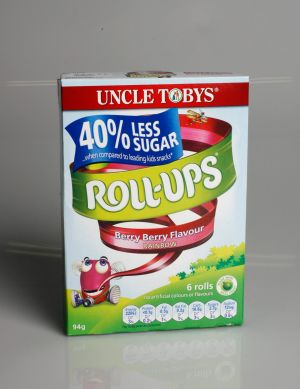Processed food and drinks that carry fruit and vegetable claims on their packaging contain as little as 13 per cent real fruit and many have negligible nutritional value, a study has found.
The less healthy the food, the more likely it was to enthuse about its fruit content.

Uncle Tobys Roll Ups, which proclaims among its “nutritional benefits” that it is “made with real fruit”, only contained only 25 per cent fruit.
A NSW Cancer Council analysis of 762 fruit and vegetable snacks, soups and juices stocked in supermarkets found that only a third passed the nutrient profiling criteria that would enable them to make health claims under the Australia and New Zealand Food Standards Code.
But fruit and vegetable claims are not regulated under the code because they refer to specific ingredients rather than nutrients.
Study author Clare Hughes said the claims deliberately misled consumers about the nutritional value of the product.
“Our concern is that fruit and vegetables are ingredients that, when put on labels, would sway people’s food choices and give the impression that they’re a healthy product,” Ms Hughes said.
“Some of the claims being made on snack foods would lead parents to think, ‘Maybe this is a good thing to put in my kid’s lunchbox’.”
Almost half the products in the fruit snacks, soups and fruit and vegetable juices and drinks surveyed carried a claim about their fruit and vegetable content.
Those that made the claims had more energy, sodium, saturated fat and sugar and less fibre than fresh fruit and vegetables.
Uncle Tobys Roll Ups, which proclaims among its “nutritional benefits” that it is “made with real fruit”, contained only 25 per cent fruit.
Charlie’s Old Fashioned Quencher had just 13 per cent fruit, and 14 teaspoons of sugar per serve.
More than 80 per cent of the fruit and vegetable drinks and 79 per cent of the fruit snacks did not meet nutrient profiling, according to the study published in Public Health Nutrition.
Juices and fruits were more likely to have nutritional value, with only 10 per cent of the soups and less than 1 per cent of juices failing to meet nutrient profiling.
A spokesman for the Australian Food and Grocery Council said 90 per cent of the surveyed products met the researchers’ and government’s standard for healthiness.
Charlie’s Old Fashioned Quencher rated 4.5 stars on the federal government’s Health Star Rating system, he said.
“These claims provide important information for consumers who want to know the ingredients are sourced from fruit and veg, as opposed to flavouring for instance.”
A spokeswoman for Nestle, which manufactures Roll Ups, said “made with real fruit” was a content claim rather than a health claim.
“Roll Ups contain concentrated puree from real fruit as clearly stated in the ingredient list on the back of the pack,” she said.
“Roll Ups are a fun, portion-controlled treat.”
But University of Wollongong senior lecturer Bridget Kelly said manufacturers could create a “health halo” over their products by promoting particular ingredients.
“We’ve been advocating for a number of years now to get that loophole closed, so that to make any nutrition claim it has to be a healthy product, because at the moment it’s really a marketing strategy.”
